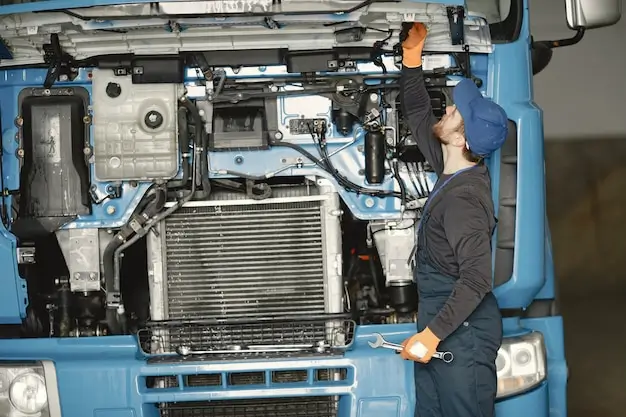
Truck maintenance isn’t just necessary; it’s critical to ensuring road safety, longevity, and efficiency. Keeping up with maintenance as a truck driver can save costs and time by preventing breakdowns and ensuring a smooth journey.
Regular Inspection Checklist
Engine and Fluid Checks
To maintain a smooth-running engine, periodically check and replace the coolant, engine oil, and transmission fluids. Look for leaks and fix them right away to stop more harm.
Brake System Maintenance
Examine the wear and tear on the brake pads, drums, and lines. Road safety depends on having brakes that operate correctly.
Exhaust System Inspection
Routine exhaust system inspections guarantee environmental compliance and the avoidance of emission problems.
Tire Inspection
Regularly check the tread depth, tire pressure, and general condition. Proper tire care guarantees maximum fuel economy and guards against blowouts.
Preventive Maintenance Schedule
Oil Changes and Filters
Maintain a regular oil change schedule and change filters according to manufacturer recommendations. The engine remains in optimal condition with clean oil and filters.
Battery Care
Check for corrosion, clean the battery terminals, and make sure the connection is tight. Properly maintained batteries prevent unexpected breakdowns.
Cooling System Maintenance
Inspect coolant levels and radiator hoses regularly. You are maintaining your cooling system properly because overheating might result in serious harm.
Tips for Long-Haul Truckers
Managing Engine Idling
To save fuel and lessen engine wear, minimize excessive idling. To preserve efficiency, modern engines are built for less idle.
Cleaning and Lubricating Components
Clean and lubricate moving parts regularly to stop rust and guarantee smooth functioning. Pay close attention to the suspension parts, bearings, and hinges.
Handling Electronics and Wiring
Verify and tighten wiring connections to avoid electrical problems. For modern trucks, electronics that work correctly are essential.
Safety Measures and Compliance
Regulatory Standards and Compliance Checks
To prevent fines and guarantee roadworthiness, follow safety guidelines and conduct regular compliance checks.
Emergency Kit and First Aid Preparation
Always keep first aid supplies and an emergency kit on hand. While traveling, being ready for the unexpected might save your life.
Importance of Regular Truck Maintenance
Essentially, routine truck maintenance prioritizes efficiency, safety, and dependability over just maintaining the vehicle, making the ride safer and more comfortable for truck drivers and other drivers.
Safety Assurance:
Trucks with regular maintenance greatly lower the likelihood of unplanned malfunctions or breakdowns when operating a vehicle. Safer travels for drivers and other road users are guaranteed by properly working brakes, tires, motors, and other essential parts.
Reliability and Consistency:
Frequent upkeep makes the truck more dependable. It guarantees that the car runs reliably, fulfilling performance requirements and reducing the possibility of unanticipated problems that could cause delays in deliveries or timetables.
Cost Savings:
Even while maintenance could appear like an extra price, it’s a tiny outlay compared to the cost of repairs that could arise from ignored problems. Frequent inspections and prompt fixes stop minor issues from growing into more significant, more expensive fixes.
Longevity of the Vehicle:
The truck’s longevity is influenced by regular upkeep and treatment. Engines, transmissions, and other properly maintained parts tend to live longer, increasing the vehicle’s lifespan.
Compliance with Regulations:
Not only is maintenance good for the truck, but it’s also required to keep up with different requirements. Authorities set safety and environmental criteria for trucks and regular inspections and maintenance guarantee that the vehicle complies.
Optimal Performance:
The truck performs at its peak when it receives routine maintenance. Improved performance and fuel economy result from properly inflated tires, oiled engines, and effective braking systems.
Peace of Mind:
Knowing that their vehicle is in top condition for truck drivers brings peace of mind. It lets them focus on their job without worrying about potential mechanical issues.
Frequently Asked Questions (FAQs)
How often should I change my truck’s engine oil?
Generally speaking, you should replace your oil every 10,000 to 15,000 miles, but it’s best to check the manufacturer’s recommendations for your car.
What can happen if I neglect tire maintenance?
Ignoring tire maintenance can result in blowouts, uneven tire wear, decreased fuel efficiency, and even accidents because of weakened traction.
Is it necessary to keep track of maintenance records?
Indeed, keeping thorough maintenance records aids in tracing service history, guaranteeing adherence to warranties, and optimizing resale value.
How can I improve fuel efficiency in my truck?
Fuel efficiency can be enhanced by minimizing needless idling, preserving appropriate tire pressure, and scheduling routine engine tune-ups.
Why is brake maintenance crucial for truckers?
One essential element of safety is the brake. The risk of accidents on the road is decreased by routine maintenance, which guarantees optimal braking function.

